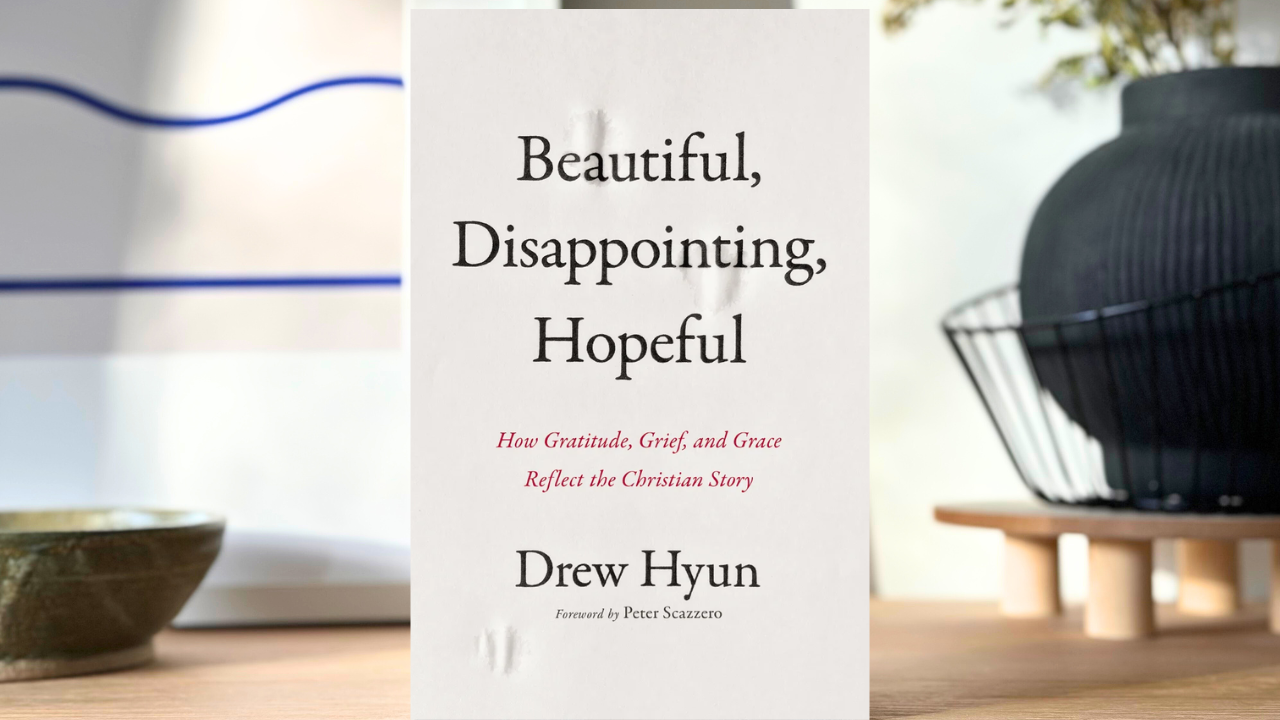Aaron Lee had the privilege of interviewing Drew Hyun over email about his new book, Beautiful, Disappointing, Hopeful: How Gratitude, Grief, and Grace Reflect the Christian Story.
When did you see how the three points of Gratitude, Grief, and Grace did in fact reflect the Christian story? How did you decide to write this book?
As a pastor, I’m often asked about what Christianity is about. Normally, I discern whether the person is asking for an apologetic book, a book about Christianity, or a personal testimony-type book.
This book was really born out of a desire to give one resource that would be a memorable way of understanding how the Christian story relates to the common human experience of beauty and disappointment, while meeting our deepest longings for hope and grace.
The three words – Beautiful, Disappointing, Hopeful – speak to the Christian story and the experience of us all, which is why I find Christian faith so compelling.
Gratitude, Grief, and Grace are also three words that encompass our response to everyday beauty, disappointment, and hope, and it was my desire to offer practical ways to build a resilient spirituality in light of what we experience everyday.
Your Korean background and upbringing plays a big role in this book. Did you always know that your ethnic/cultural identity would play such a big role in your testimony? How has it played a part in your ministry?
On one hand, “yes”. I knew that my ethnic/cultural identity would play a big role in my testimony because I am keenly aware that my ethnic/cultural identity has profoundly shaped me throughout my life. But on another hand “no”, because my personal story has been my lived, normal experience that I believe has elements that are common to what it means to be human.
My background and context as a Korean-American deeply shapes my ministry because it’s part of who I am–it’s filtered the way I understand life, God, and my own humanity. And that’s what’s so beautiful about Christian faith. It meets us in the most personal ways, and yet also applies to the universal longings of the human heart.
Your relationship with your parents seems inseparable from your salvation story. You mentioned going to counseling, although that seemed to be a bit later in your life. What advice would you give to children or parents with strained relationships? How can they best encourage each other in the faith through cultural differences?
I love how Christian faith has to do with everyday life, including the relationships that give us the most joy and pain. On one hand, one of the most beautiful invitations of Christian faith is to be welcomed into a new family of Jesus, learning to be loved and to love as Jesus does, which is a remarkable invitation when considering the pain and strain that some of us have experienced in our home lives. Personally, I found in Jesus the one who loves me like no one else in the world.
At the same time, Christian faith also invites us to a life of gratitude, grief and grace that belies the ways of the world. So yes, we receive acceptance into the new family of Jesus, but part of that journey is now being challenged to live into a spiritual journey of forgiveness and grace.
One mentor once said to me, “God loves us the way we are, but he loves us enough not to leave us the way we are.”
In other words, my faith has given me a love and hope that I could have never dreamed of. And also, my faith has given me a pathway to wrestle—with gratitude, grief, and grace—with some of the most painful wounds I carry, especially in my past.
Can you describe the NYC cultural climate and does it relate to how and why your book is evangelistic? Or an easier question may be why did you choose to write a book that was evangelistic instead of a book for those who are already believers?
I want people to know, both Non-Christians AND Christians, that Christian faith can help make sense of our world and lived experience. I really do believe that Jesus is the hope of the world, and following Him is a true and compelling way of life!
In a city like New York, there is so much ambition and longing which inevitably lead to the same mysterious questions we all wrestle with around themes of suffering, death, love, and eternity. Christian faith is a welcome invitation to follow Jesus as the answer to our hearts’ deepest longings.
You reveal a lot of yourself in this book. Do you have any encouragement for pastors or leaders in terms of being vulnerable as they witness Christ to the world? Or, how would you persuade others that it is worth the risk to put yourself out there?
I think this generation is looking for a faith that’s real and relates to everyday life. My life is what I know best, and I can only share about how God has met me in beauty, disappointment, and hope. And I trust that God can meet others in those very same experiences – because that’s what the story of Jesus and Christianity is about – a God who meets us, saves us, and offers us a new way of life.
My hope is that Christians, pastors or leaders or otherwise, can always find how our faith really does meet us in the wide swath of life experiences that each of us go through.

